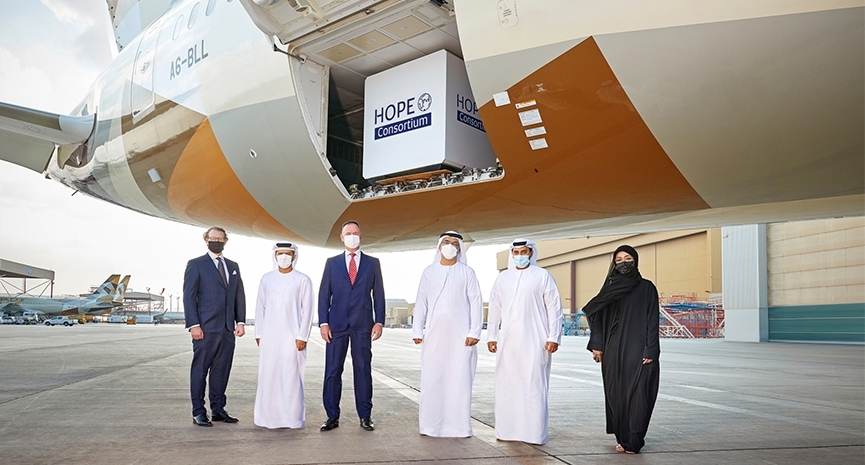Abu Dhabi launches Hope Consortium for global vaccine distribution
The department of health Abu Dhabi, Etihad Cargo, Abu Dhabi Ports Group, Rafed and SkyCell launched Hope Consortium to handle more than six billion vaccine doses globally.

November 26, 2020: The department of health – Abu Dhabi, Etihad Cargo, Abu Dhabi Ports Group, Rafed and SkyCell launched Hope Consortium to handle more than six billion vaccine doses globally.
The consortium represents a complete supply chain solution to address vaccine transport, demand planning, sourcing, training, and digital technology infrastructure, and facilitate vaccine availability across the world.
The news follows Hope Consortium member Etihad Cargo and the consortium transporting five million vaccines in November on behalf of the department of health – Abu Dhabi.
As part of the Hope Consortium, SkyCell will establish a regional service and manufacturing centre in Abu Dhabi.
The Hope Consortium has pooled its collective expertise to garner a multi-faceted capability to provide logistics services to handle over six billion doses from the vaccines being developed and manufactured around the world – whether in single or multi doses – in cold and ultra-cold conditions in 2021, rising to over three times more doses by the end of next year – the largest capacity and logistics capability regionally and one of the largest globally.
“The Hope Consortium is a prime example of how Abu Dhabi is leading in providing solutions, capabilities and capacities to help the world get through this global pandemic. It is a continuation of all players’ collaboration of a UAE-based public-private partnership that spans the globe. While assuring vaccine supply to the domestic market, the Hope Consortium will offer international governments, non-governmental organisations, and vaccine suppliers a cohesive solution across every supply chain step – from air freight, regional storage and temperature monitoring, to inventory management, cold and ultra-cold container solution, regulatory clearance, and healthcare and pharma quality assurance,” explained Abdullah bin Mohammed Al Hamed, chairman of the department of health – Abu Dhabi.
“Developing a vaccine is only the first step in getting to a solution, getting that vaccine to the whole globe, while maintaining a robust integrity of temperature is an equal challenge by itself, the Hope Consortium will provide that solution on the highest level of quality.
“Consortium partners already have extensive expertise in the global delivery of millions of Covid-19 related items, such as personal protective equipment, diagnostics consumables, vaccines and pharmaceuticals. As we progress talks with vaccine manufacturers to apprise them of our global distribution capabilities, the Hope Consortium will harness the united expertise of various Abu Dhabi and UAE stakeholders to provide a fully-fledged, end-to-end solution specifically for Covid vaccine distribution needs.”
Distribution of the vaccines, which will be stored in Abu Dhabi Ports Company facilities, will be carried out by Etihad Cargo.
“With two thirds of the world’s human footprint within a four-hour flight of Abu Dhabi, the UAE capital’s investment in technological expertise and world-class infrastructure facilities means we can serve as a global logistical hub to, and for, the world,” explained Tony Douglas, group CEO, Etihad Aviation Group. “Etihad Cargo’s role in the consortium will leverage our outstanding pharmaceutical logistics expertise and specialised pharma and healthcare service, PharmaLife, the IATA CEIV Pharma certified product capable of facilitating temperature-sensitive cargo between +25⁰C and -80⁰C. Our network reach across key destinations will be supported by the utilisation of our charter operations to meet global demand for swift and secure Covid-19 vaccine shipments.
“We are already managing all anticipated shipment elements through our dedicated Covid-19 vaccines workforce,” Douglas added. “A dedicated pharmaceutical handling facility to accommodate increased capacity at our Abu Dhabi hub is also currently under review, as well as additional thermal covers and enhanced capabilities at origin stations based on established pharma trade lanes and specific requests.”
As part of the Hope Consortium, Abu Dhabi Ports will leverage its capabilities as an innovation epicentre serving the Middle East and wider world through Abu Dhabi as a supply chain gateway connecting East and West.
Mohamed Juma Al Shamisi, group CEO of Abu Dhabi Ports, said, “Abu Dhabi Ports plays a key role in supporting the Abu Dhabi vision in advancing logistic services in the emirate and leading the post-Covid-19 revival and economic recovery through robust partnerships. Our expansive operations at KIZAD are among the largest cold chain and ultra-cold storing in the region and enable us to support the emirate’s drive to spearhead global immunisation efforts that will positively impact millions of lives.”
“In addition to leveraging our world-class trade facilitation expertise, our efforts also rest on our Maqta Gateway subsidiary, which is playing a leading role in the development of integrated, digital, global commerce.”
Noura Al Dhaheri, head of digital cluster – Abu Dhabi Ports, CEO of Maqta Gateway, said, “Supporting the uninterrupted flow of critical cargo, such as medical and food supplies have been crucial in Abu Dhabi Ports’ story during 2020, but the distribution of vaccines will form the most significant success to date. Maqta Gateway is committed towards creating innovative digital solutions to boost the transparency and integrity of the region’s supply chain.”
The Hope Consortium intends to transport the vaccines using SkyCell’s hybrid containers. The storage and transportation containers are secured through an IoT monitoring service which tracks temperature conditions to ensure sensitive vaccines are protected even under extreme conditions.
“Our hybrid containers will safeguard the full efficacy of vaccines that are vital to defeat the pandemic, all while reducing long-term business and environmental costs,” explained Richard Ettl, Chief Executive Officer of SkyCell. “The Hope Consortium has the right partners, infrastructure and service ecosystem to ensure time and temperature sensitive transportation in a seamless cool chain operation.”


